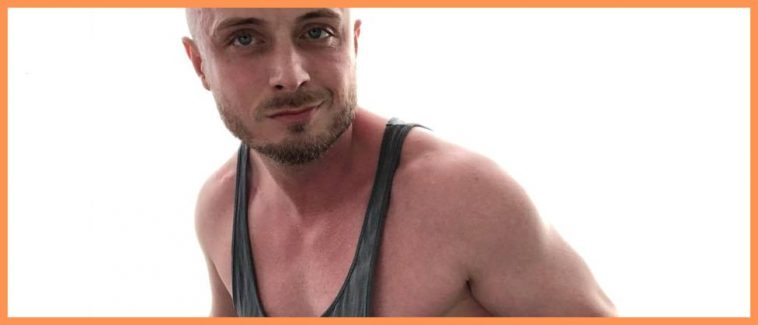For Greg Owen, it was already too late. When he set out to try to find a new preventative medicine – not yet available in the British healthcare system, the NHS – that would prevent him from contracting the AIDS virus, he had already been contaminated.
Still, he and a friend decided to invest in an ambitious plan to help thousands of other people have access to the medicine.
"You know when you do something and your whole life changes? Pressing the send button was the moment that changed my life", recalls Owen, about the day he revealed on Facebook that he was HIV positive and that he could have avoided getting infected. if he was taking the prophylactic medication he wanted so much.
Owen grew up in Belfast, Northern Ireland. He was the eldest in a family of six children. It was the 1980s, a time when Northern Ireland was witnessing violent sectarian conflicts and when Owen, as he himself says, was "very gay".
Years passed. In 2015, Owen worked in bars and clubs, and slept on sofas at friends' houses in London.
That's when Owen found Alex Craddock. "He was cute, a little cheeky. And I had a little crush on him", he says.
Craddock had returned from New York and was testing PrEP (Pre-Exposure Prophylaxis), a pill that combines two drugs (tenofovir + emtricitabine) that block some "pathways" that HIV uses to infect the body.
If you take PrEP daily and have sex with a person with HIV, the combination is almost 100% effective in preventing you from becoming HIV positive, even if condoms were not used during the relationship.
There are those who take it days before and after sexual intercourse. There are those who take it daily. According to the Ministry of Health, PrEP begins to take effect seven days after using the pill in cases of anal intercourse and 20 days for vaginal intercourse.
It is recommended for people who have a greater chance of coming into contact with HIV, such as risk groups – men who have sex with other men, trans people and sex workers.
Owen really wanted similar treatment to his friend. "I was trying to find PrEP, and Alex was already using the medication, which he had gotten in the US." At that time, the treatment was not available through the UK public health service. However, HIV diagnoses for at-risk groups were rising. One in eight gay men in London have HIV.
PrEP prevents; It does not cure AIDS, a chronic disease that affects the immune system and can lead to death if left untreated.
Before taking PrEP, a person needs to make sure they have not been infected with HIV.
Owen had access to a small dose of the medicine and went for a test to find out if he could adopt the preventive method.
He wasn't worried. He was tested for STDs regularly. But this time, the test gave, for the first time, the other result: positive for HIV.
"It was like a bomb," recalls Owen, who felt paralyzed and alone, as if he were trapped. “I saw people passing by and I felt like I was in a bubble, like something was separating me from the rest of the world,” he says.
That's when he made the decision that changed his life and, probably, those of thousands of other gay men. He decided to reveal his secret. He posted on Facebook that he was HIV positive. He talked about PrEP, this drug that few had heard of but that could have prevented his contamination.
People's first reaction was shock at the revelation, but they soon began to ask what PrEP was and why it would prevent him from becoming infected with HIV. Owen responded by explaining how prophylaxis worked. And the next question, inevitably, was: how do I get PrEP?
Given people's interest, Owen and Craddock decided that something needed to be done. Craddock recalls that at the time, they thought they didn't even need the government to help people order the medicine online.
From Craddock's room, they began to create a website, with all the necessary information and a link: "click here to buy".
According to Owen, the link led directly to websites that sold the medicine online.
It was a radical idea: "I'm not going to wait for the NHS to come and save me," Craddock recalls. "I want PrEP now and this is how I'm going to get it."
The site was named "Quero Prep Agora" and was launched in October 2015. In 24 hours, it had 400 hits and, from then on, it grew quickly.
And it also attracted attention from the medical community. Mags Portman, an NHS consultant on HIV and sexual health, contacted Owen to meet him. Will Nutland, an activist on another website that also provided information about PrEP, ended up joining Owen and Cradddock's project.
Nutland ended up serving as a guinea pig. He took PrEP from new distributors and had tests at consultant Mags Portman's clinic. He tested over 300 batches and none appeared to be fake.
At the same time, the UK Medical Research Council began a study comparing outcomes for users and non-users of the preventative medicine.
The result was so evident – an 86% drop in new HIV infections among PrEP users – that the research was stopped early and the medicine was also offered to those who were not taking it.
At the end of 2014, the British Health Service (NHS) began procedures to decide whether PrEP should be made available. Time passed, but no decision had been made until 2016.
"It was very difficult and frustrating, since doctors knew about the existence of this preventive tool, but they could not have access to it or prescribe it", says consultant Mags Portman, saying that many doctors followed patients at risk and that ended up contaminated.
At a certain point, the NHS decided to say no to the use of the medicine.
"I was shocked," says Sheena McCormack, professor of clinical epidemiology, who led the Medical Research Council study. For Portland, the decision was "absolutely horrible."
So the idea that started in Owen's bedroom ended up in the UK Supreme Court.
A well-known charity, the National Aids Trust, went to court to demand that the NHS consider PrEP using the same standards used to evaluate any new medicine.
The NHS, which was facing one of its worst budget crises, argued that, legally, it was not responsible for funding prevention – and that this would be the responsibility of local governments.
The case ended up exposing something else – the view of part of British society that gay men should be responsible for their own fate.
Journalist Andrew Pierce, who is gay, spoke out against the government's offer of the drug.
"I don't think the NHS can afford £450 a month for a homosexual," he said. "It's absurd, why should taxpayers subsidize a reckless sex life?", asked the journalist.
For Owen, "gay men have the right to live without fear, without guilt and to have sex without illness." "We are ultimately conditioned to believe that love, particularly sex between two men, always has to have a price to pay. And it's not meant to be that way."
In court, the British healthcare system's argument for not offering PrEP was not sustained. If the NHS offered statins to healthy people to prevent problems like cholesterol, it could offer other preventative drugs.
The court's decision was in favor of the National Aids Trust. The NHS appealed, but in November 2016 it lost again and was forced to take over PrEP distribution.
Owen is back in Northern Ireland where he works in a pub. "I literally cried. I was serving beer to a kid who probably thought I was crazy," he said, recounting how he reacted upon learning of the court ruling.
What has happened in the Kingdom since then
Last year, eight clinics in London and several outside the English capital took part in a trial to offer PrEP.
Furthermore, many men can buy their own medicine, especially since the treatment has been widely publicized. In August last year, the NHS announced that it would offer PrEP to 10 people.
In Wales, the preventative medicine is available at chosen NHS clinics. But there is still no PrEP in Northern Ireland. In the United Kingdom, Scotland is the only region to offer the medicine through the national healthcare system.
What is it like in Brazil
In Brazil, according to the Ministry of Health website, HIV Pre-Exposure Prophylaxis is available in 36 services of the Unified Health System in 22 Brazilian cities. The services began receiving the medicine in December last year.
The initial investment in Brazil was estimated at R$8,6 million. This is the cost of 3,6 million tablets, to meet demand for approximately one year.
Also according to the Brazilian Ministry of Health, the World Health Organization (WHO) has recommended, since 2012, the offer of PrEP, which is already available in public health networks in France and South Africa. In the United States, Belgium, Scotland, Peru and Canada, it is sold on the private network.
In the UK, for the first time in recent years, HIV diagnoses among gay men are falling. Between 2015 and 2016, it fell by 20%. In some London clinics, the drop reached 40%.
Critics say PrEP could harm campaigns for safe sex. They cite a study conducted in Australia over four years and published in the academic journal Lancet, suggesting that while the use of PrEP increases, condom use falls. Additionally, men who do not use the medication are also using condoms less, according to the study.
Researchers from the British university University College London (UCL) evaluated the cost-benefit of PrEP. They argue that the drug would harm the NHS in the first 40 years, but that, from then on, it would bring economic benefits. After 80 years, it would save the country £1 billion.
Owen always cries when he remembers what he had to do and go through until he saw the medicine being offered, albeit on a restricted basis, in the healthcare system.
He remembers a specific call that made him cry a lot. Epidemiologist Sheena McCormack was on the line, it was Christmas 2016, just weeks after the court ruling in which the NHS was defeated.
"I want you to think about the people, the thousands of people who are walking around, HIV negative, because of something you did," McCormack said.
Looking back, Owen says there wasn't a grand plan, the idea was to help at least one person. But he ended up helping thousands.
Article originally published on the with the BBC



